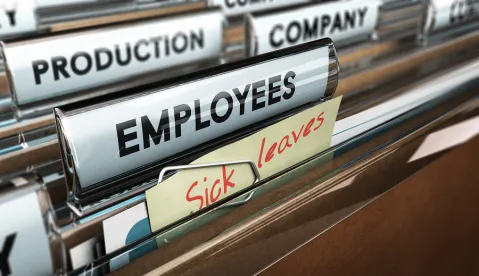The New Jersey Paid Sick Leave Act (NJPSLA) takes effect on October 29, 2018. For information about the law’s provisions, please see our prior blog. The New Jersey Department of Labor and Workforce Development (NJDOL) also released an FAQ regarding the new law, as well as proposed regulations in connection with the law and the required notice that employers must post in the workplace and provide to all New Jersey employees.
The NJDOL released the notice on October 3, 2018. Employers can find a copy of the notice on the NJDOL’s website. A New Jersey employer is required to post the notice in a conspicuous place that is accessible to all employees in each of the employer’s locations. Employers must also (1) provide all employees with the notice by November 29, 2018; (2) provide all subsequently hired employees with the notice at the time of hiring; and (3) provide every employee with the notice upon his or her first request. Employers do not have to obtain signed acknowledgments from employees indicating that they have received the notice, but employers may wish to do so to avoid disputes over whether they have satisfied this requirement.
The NJDOL also released proposed regulations for the NJPSLA on September 18, 2018. The proposed regulations address many questions that New Jersey employers have about the NJPSLA. Written comments about the proposed regulations must be provided to the NJDOL by December 14, 2018, and final regulations will be issued sometime thereafter.
Below is a summary of key proposed regulations.
Notice
The proposed regulations allow employers to satisfy the conspicuous posting requirement by posting the NJPSLA notice to an Internet or Intranet site that is accessible to employees. E-mail dissemination of the notice also satisfies the notice requirement.
Current Employees
For employers using the accrual method, the proposed regulations state that employees who are hired on or before October 29, 2018, must begin accruing earned sick leave by no later than October 29, 2018.
Exempt Employees
For purposes of paid sick leave accrual, the proposed regulations provide that employers can either record the hours actually worked by an exempt employee or assume that an exempt employee works 40 hours in a workweek.
Changing Benefit Years
Under the NJPSLA, an employer is free to designate its benefit year. If an employer decides to change its designated benefit year, it must obtain approval from the NJDOL. The proposed regulations outline the process for employers to follow, including the following:
-
The employer must provide at least 30 calendar days’ notice to the NJDOL prior to the proposed change.
-
The notice to the NJDOL must (1) be in writing, (2) specify the existing benefit year, (3) specify the proposed new benefit year, (4) state the effective date of the new benefit year, (5) provide the reason for the change in benefit year, and (6) provide a current list of employees with contact information and paid sick leave history for the past two benefit years.
If the NJDOL concludes that the proposed change would prevent employees from using or accruing paid sick leave, the Commissioner will impose a benefit year on the employer for at least one year.
Harmonizing with Existing Paid Time Off Policies
The proposed regulations state that an employer’s existing paid time off policy will satisfy the requirements of the NJPSLA if the existing policy is in accordance with the accrual, use, payment, and carry-over provisions of the new law.
Rate of Pay
Concerning an employee’s rate of pay, the regulations provide the following:
-
If an employee has two or more different jobs for the same employer or if an employee’s rate of pay fluctuates for the same job, the rate of pay for purposes of calculating sick leave pay shall be the amount that the employee is regularly paid for each hour of work as determined by adding together the employee’s total earnings, exclusive of overtime pay, for the seven most recent workdays when the employee did not take leave and dividing that sum by the total hours of work during that seven-day period.
-
If an employee is paid by commission, whether base wage plus commission or commission only, the employer must pay the employee during earned sick leave an hourly rate that is the base wage or the State minimum wage rate, whichever is greater.
-
If an employee is paid on a piecework basis, whether base wage plus piecework or piecework only, to calculate the employee’s rate of pay for earned sick leave, the employer shall add together the employee’s total earnings for the seven most recent workdays when the employee did not take leave and divide that sum by the number of hours that the employee spent performing the work during workdays.
-
If an employee uses earned sick leave during hours that would have been overtime if worked, the employer is not required to pay the overtime rate of pay.
-
If the amount of a bonus is wholly within the discretion of the employer, the employer is not required to include the bonus when determining the employee’s rate of pay for earned sick leave purposes.
Independent Contractors
Similar to other laws, only employees – not independent contractors – are eligible for paid sick leave under the NJPSLA. The proposed regulations state that the “ABC” test will be used to determine whether a worker is an employee or an independent contractor under the NJPSLA.
Foreseeable Leave
The proposed regulations define foreseeable leave to include any paid sick leave that the employee is able to predict or knows in advance, such as a scheduled doctor’s visit, a regularly occurring medical treatment, or regularly scheduled therapist appointment.
“Blackout Dates” for Foreseeable Sick Leave
The proposed regulations only permit blackout dates for verifiable high-volume periods or special events, during which the use of foreseeable earned sick leave would disrupt the employer’s operations. An example of a high-volume period would be, for an airline industry employer, the period during which it experiences a predictable increase in customer activity, such as flying on and around Thanksgiving. An example of a special event would be, for a manufacturer of retail products, the day or week during which it is making a new product available for the first time (such as a product launch).
Unforeseeable Leave
The proposed regulations define leave that is “not foreseeable” as when employees require time to care for, or obtain medical treatment for, themselves or a family member that was not reasonably anticipated. An example of a need to use earned sick leave that is “not foreseeable” is when an employee wakes up in the morning with a fever and does not feel well enough to report to work that morning.
Recordkeeping Requirements
The NJPSLA requires employers to keep records of employee hours worked and paid sick leave used for five years. The proposed regulations further clarify employer obligations as discussed below:
-
Employers are not required to maintain or retain records documenting hours worked by exempt employees, as long as the employer either advances such employees earned sick leave or assumes (solely for the purpose of calculating earned sick leave accrual) that they work 40 hours per week.
-
Recordkeeping obligations apply to sick leave that is accrued, advanced, used, paid, paid out, and carried over.
-
Records must be kept at the place of employment or in a central office in New Jersey and must be available for inspection by the NJDOL.
-
Records concerning the health of an employee or a family member of the employee, or of domestic or sexual violence related to an employee or an employee’s family member must be treated as confidential and not disclosed except to the impacted employee or with written permission by the impacted employee.
Penalties
Under the proposed regulations, Employers that knowingly and willfully violate the NJPSLA shall be guilty of a disorderly person offense, and upon conviction for a first violation, will be punished by a fine ranging from $100 to $1,000 or by imprisonment for 10 to 90 days, or both. Further convictions are punishable by fines ranging from $500 to $1,000 or by imprisonment for 10 to 100 days, or both.
Additionally, the NJDOL may assess and collect administrative penalties up to $250 for a first violation and from $250 to $500 for further violations. Further, the NJDOL can assess additional fees, such as (1) 10% of the amount of any payment for a first violation, (2) 18% of the amount of any payment for a second violation, and (3) 25% of the amount of any payment for each additional violation.
Next Steps
Although the NJDOL’s proposed regulations are not final and may be revised after the comment period, the NJPSLA effective date is upon us. New Jersey employers should take care of their posting and distribution obligations, decide whether to use the accrual or frontloading method to calculate paid sick time during the benefit year, and review and revise their PTO and recordkeeping policies to ensure compliance with the NJPSLA’s requirements. Employers with questions should consult with employment counsel.





 />i
/>i

